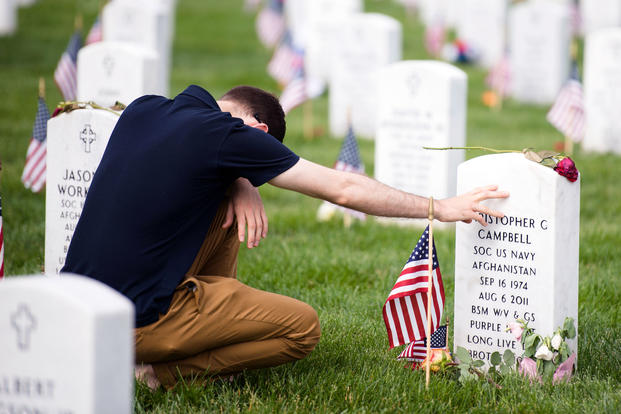A proposal making its way through Congress would create a standard system for families of some fallen troops to access military bases. But that isn't necessarily a good thing, advocates say.
"Surviving families of deceased members of the Armed Forces confront many challenges, often made worse by policies that fail to compassionately honor the memory of their loved one's service and sacrifice to the nation," the legislation says. "Individual military services have recognized the need to provide installation access to Gold Star families to attend memorial events, visit gravesites, and access other benefits for which family members are eligible and entitled."
The legislation, which has been approved by the House and is under consideration by the Senate, builds on an access program rolled out by the Air Force last year. Currently, surviving spouses who have not remarried and children of troops who died in service have base access. The bill would expand that access to parents, siblings and remarried spouses.
Giving families of the fallen easy, consistent access to bases seems like a reasonable idea, military family advocates say, until you focus on the words "some fallen troops."
That's because the legislation, known as the Gold Star Family Support and Installation Access Act of 2017, gives base access only to the families of troops who were killed in combat or by terrorists -- in other words, "Gold Star" family members.
First, a few important details. The spouse and children of any military member killed in service, regardless of where or how they die, is eligible for military survivor benefits, including death gratuity, any Servicemembers Group Life Insurance payment, ongoing Tricare coverage and access to on-base amenities such as the commissary. Parents and siblings of the fallen might also qualify for some benefits, particularly if the service member wasn't married.
But the term "Gold Star" is a specific designation for some surviving families members set by law. "Gold Star family members" are the direct family members of a service member who died in combat, in an international terrorist attack or while serving overseas as part of a peacekeeping force.
The families of those who are killed in training accidents, including the nine Puerto Rican National Guard members killed in a plane accident early this month or the 16 Marines killed in an aircraft accident last year, still receive military death benefits but are not, by law, Gold Star family members. Neither are the families of most troops who died by suicide or from a medical emergency outside deployment.
A Military Times report in early April counted more than 130 troops killed in aviation accidents in the last five years. The vast majority do not qualify as combat deaths.
That means, under the proposed legislation, the families of those fallen would not be eligible for the base access card.
And that's a big problem, say officials with the Tragedy Assistance Program for Survivors (TAPS) and the National Military Family Association (NMFA). By passing a law that recognizes the need only for "Gold Star families to attend memorial events, visit gravesites, and access other benefits," lawmakers are ignoring an entire category of survivors who have the same needs.
By doing so, officials with those organizations told me, Congress is creating two classes of military survivors and indicating that the loss of those who died in combat or overseas is more significant than those who died in other ways.
Officials with TAPS and NMFA said those organizations are working to oppose the legislation.
-- Amy Bushatz can be reached at amy.bushatz@military.com.










